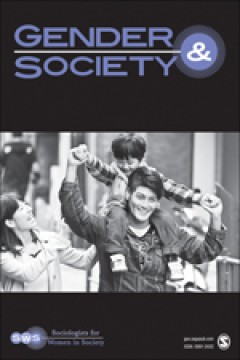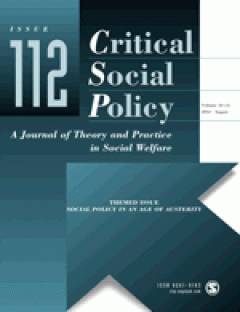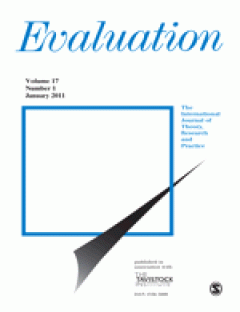Filter by

Normative Resistance and Inventive Pragmatism: Negotiating Structure and Agen…
Transgender individuals and families throw existing taxonomic classification systems of identity into perplexing disarray, illuminating sociolegal dilemmas long overdue for critical sociological inquiry. Using interview data collected from 50 cisgender women from across (primarily) the United States and Canada, who detail 61 unique partnerships with transgender and transsexual men, this work co…
- Edition
- Volume 26 Number 4, August 2012 p. 574-602
- ISBN/ISSN
- 0891-2432
- Collation
- p. 574-602
- Series Title
- Gender & Society
- Call Number
- -

Gendered Organizations in the New Economy
Gender scholars draw on the �theory of gendered organizations� to explain persistent gender inequality in the workplace. This theory argues that gender inequality is built into work organizations in which jobs are characterized by long-term security, standardized career ladders and job descriptions, and management controlled evaluations. Over the past few decades, this basic organizational logi…
- Edition
- Volume 26 Number 4, August 2012 p. 549-573
- ISBN/ISSN
- 0891-2432
- Collation
- p. 549-573
- Series Title
- Gender & Society
- Call Number
- -

Adolescents of the U.S. National Longitudinal Lesbian Family Study: Male Role…
This article focuses on the influence of male role models on the lives of adolescents (N = 78) in the U.S. National Longitudinal Lesbian Family Study. Half of the adolescents had male role models; those with and those without male role models had similar scores on the feminine and masculine scales of the Bem Sex Role Inventory, as well as on the trait subscales of the State-Trait Personality In…
- Edition
- Volume 26 Number 4, August 2012 p. 603-638
- ISBN/ISSN
- 0891-2432
- Collation
- p. 603-638
- Series Title
- Gender & Society
- Call Number
- -

Fatherhood and Youth Sports: A Balancing Act between Care and Expectations
Youth sports have been recognized as an arena for men to meet increased cultural expectations of being involved in their children�s lives. Indeed, in contrast to other child care practices, many men are eager to take part in their children�s organized sports. Drawing on an ethnographic study of middle-class families in the United States, this study examines how men juggle two contrasting cultur…
- Edition
- Volume 26 Number 4, August 2012 p. 639-664
- ISBN/ISSN
- 0891-2432
- Collation
- p. 639-664
- Series Title
- Gender & Society
- Call Number
- -

The alchemy of austerity
The return of austerity has provoked social conflict, political controversy and academic disputes. In this article we explore some of these through the metaphor of an �alchemy of austerity� that forms the foundation for strategies of state retrenchment through which the consent of populations is sought. We begin, in �Magical thinking�, by tracing some of the discursive repertoires that circulat…
- Edition
- Volume 32 Number 3, August 2012, p. 299-319
- ISBN/ISSN
- 0261-0183
- Collation
- p. 299-319
- Series Title
- Critical Social Policy
- Call Number
- -

The Just’s Umbrella: Austerity and the Big Society in Coalition policy and …
The formation of the Coalition government in 2010 has resulted in unprecedented spending cuts presented as necessary austerity, together with the promotion of the �Big Society� as the panacea for social ills. This article argues that the cuts continue a thirty-year process of redistribution to the rich. Rather than being a necessary response to the economic crisis, they constitute a neo-liberal…
- Edition
- Volume 32 Number 3, August 2012, p. 320-342
- ISBN/ISSN
- 0261-0183
- Collation
- p. 320-342
- Series Title
- Critical Social Policy
- Call Number
- -

Crisis social policy and the resilience of the concept of community
This paper considers the continuing resilience of the notion of community in social policy making and wider political commentary in the contemporary UK. Focusing in particular on the ways in which community is negatively and positively invoked and mobilized in narratives of the �big� and �broken� societies, it considers why the notion of community, so popular with the previous New Labour govern…
- Edition
- Volume 32 Number 3, August 2012, p. 343-364
- ISBN/ISSN
- 0261-0183
- Collation
- p. 343-364
- Series Title
- Critical Social Policy
- Call Number
- -

Men’s Perceptions of Women’s Rights and Changing Gender Relations in Sout…
Emerging out of increased attention to gender equality within violence and HIV prevention efforts in South African society has been an intensified focus on masculinities. Garnering a deeper understanding of how men respond to shifting gender relations and rights on the ground is of urgent importance, particularly since social constructions of gender are implicated in the HIV/AIDS epidemic. As s…
- Edition
- Volume 26, Number 1, February 2012 p. 97-120
- ISBN/ISSN
- 0891-2432
- Collation
- p. 97-120
- Series Title
- Gender & Society
- Call Number
- -

Extensive Mothering: Employed Mothers’ Constructions of the Good Mother
Social scientists have provided rich descriptions of the ascendant cultural ideologies surrounding motherhood and paid work. In this article, I use in-depth interviews with a diverse sample of 40 employed mothers to explore how they navigate the �intensive mother� and �ideal worker� ideologies and construct their own accounts of good mothering. Married mothers in this sample construct scripts o…
- Edition
- Volume 26, Number 1, February 2012 p. 73-96
- ISBN/ISSN
- 0891-2432
- Collation
- p. 73-96
- Series Title
- Gender & Society
- Call Number
- -

‘Community cohesion’: Reflections on a flawed paradigm
This paper interrogates a concept at the core of a social policy agenda that has dominated thinking in the UK over the past decade. It argues that the notion of �community cohesion� is based on a fundamentally flawed interpretation of the sources of tension and conflict in Britain�s towns and cities. It overly ethnicizes societal divisions and essentializes ethnicity. Examining the development …
- Edition
- Volume 32, Number 2, May 2012 p. 184-202
- ISBN/ISSN
- 0261-0183
- Collation
- p. 184-202
- Series Title
- Critical Social Policy
- Call Number
- -

Maximizing conservation evaluation utilization
Evaluation utilization in conservation management emphasizes the use of �appropriate� information from the perspective of an expert provider. An alternative is to emphasize the information needs of recipients. Doing so ensures evaluation information is relevant to expected users and uses. The authors worked with an Australian conservation management agency to address barriers associated with en…
- Edition
- Vol. 17 no. 1, January 2011.pp. 53-71
- ISBN/ISSN
- 13563890
- Collation
- -
- Series Title
- Evaluation
- Call Number
- -

Between Individual and Collective Memory: Coordination, Interaction, Distribu…
Human memory in the wild often involves multiple forms of remembering at once, as habitual, affective, personal, factual, shared, and institutional memories operate at once within and across individuals and small groups. The interdisciplinary study of the ways in which history animates dynamical systems at many different timescales requires a multidimensional framework in which to analyse…
- Edition
- Vol. 75, No. 1, Page 23-48
- ISBN/ISSN
- 0037-783X
- Collation
- -
- Series Title
- Social Research: An International Quarterly of the Social Sciences
- Call Number
- -

Transformations between History and Memory
“Collective memory” is an umbrella term for different formats of memory. Interactive and social memory are both formats that are embodied, grounded in lived experience that vanish with their carriers. The manifestations of political and cultural memory, on the other hand, are grounded on the more durable carriers of external symbols and representations and can be re-embodied and trans…
- Edition
- Vol. 75, No. 1, Page 49-74
- ISBN/ISSN
- 0037-783X
- Collation
- -
- Series Title
- Social Research: An International Quarterly of the Social Sciences
- Call Number
- -

Through a Glass, Darkly: Photography and Cultural Memory
The appearance of digital photography in the late twentieth century raised a significant challenge to the most powerful idea attached to photography in the nineteenth and most of the twentieth centuries, that it was a kind of memory and hence the source of reliable historical data. Traditional or analogue photographs were assumed to be reliable records of the past simply by virtue of bein…
- Edition
- Vol. 75, No. 1, Page 111-132
- ISBN/ISSN
- 0037-783X
- Collation
- -
- Series Title
- Social Research: An International Quarterly of the Social Sciences
- Call Number
- -

Collective Memory and Narrative Templates
An episode of social conflict between Russian and Estonian “mnemonic communities” is used as a framework for exploring issues of collective memory. In order to understand the strong Russian reaction to the Estonian decision to move a memorial statue, it is argued that the notion of “deep memory” is needed, a notion that is, in turn, grounded in the construct of a “narrative temp…
- Edition
- Vol. 75, No. 1, Page 133-156
- ISBN/ISSN
- 0037-783X
- Collation
- -
- Series Title
- Social Research: An International Quarterly of the Social Sciences
- Call Number
- -

A Tale of Easter Ovens: Food and Collective Memory
This article considers the power of food as a vehicle for memory by exploring the ways that food crosses the personal and the collective, the individual and the social. It examines these questions through the lens of certain Easter practices on the island of Kalymnos, Greece, concerning the preparation of lamb. The ovens and pots used to prepare lamb are a marker of Kalymnian identity, bu…
- Edition
- Vol. 75, No. 1, Page 157-182
- ISBN/ISSN
- 0037-783X
- Collation
- -
- Series Title
- Social Research: An International Quarterly of the Social Sciences
- Call Number
- -

Creating Shared Memories in Conversation: Toward a Psychology of Collective M…
Collective memories are often formed through the conversations community members have with each other. The effectiveness of these conversations to transmit a memory across a community and to produce a shared and stable mnemonic representation is constrained by psychological factors. This essay examines the effects of speakers' retellings of past events (a) on listeners' memories and (b) o…
- Edition
- Vol. 75, No. 1, Page 183-216
- ISBN/ISSN
- 0037-783X
- Collation
- -
- Series Title
- Social Research: An International Quarterly of the Social Sciences
- Call Number
- -

A Tour of the Battleground: The Seven Circles of Pan-European Memory
The people we call Europeans include many millions of European Union citizens, the Swiss, the Ukrainians, the Turks, the Norwegians, the Croatians, the Serbs, and the Albanians. Do they share memories and a common sense of history? Indeed, should Europeans share memories? Each of the European nations has accumulated a stockpile of tales and myths that allow its citizens to act in solidari…
- Edition
- Vol. 75, No. 1, Page 217-236
- ISBN/ISSN
- 0037-783X
- Collation
- -
- Series Title
- Social Research: An International Quarterly of the Social Sciences
- Call Number
- -

The Work of Memory: Time, Identity, and Justice
In this essay, I argue that the political community’s identity and its sense of its own coherence as a responsible agent across time rest squarely on the work of collective memory. The protean volatility of the politics of memory reminds us that in our world (or perhaps it always and everywhere was so), memory is intertwined with power, interest and resistance precisely because it is so v…
- Edition
- Vol. 75, No. 1, Page 237-262
- ISBN/ISSN
- 0037-783X
- Collation
- -
- Series Title
- Social Research: An International Quarterly of the Social Sciences
- Call Number
- -

Collateral Damage of History Education: National Socialism and the Holocaust …
History is not only on the curriculum, and it is not only in the subject of books, journal, radio and television progams, or public debates that explicitly deal with the past and with the question of how to remember it in an adequate way. History is also conveyed en passant. It is inscribed in the fabric of everyday life, in people's habits and routines, in things they live with and place…
- Edition
- Vol. 75, No. 1, Page 287-314
- ISBN/ISSN
- 0037-783X
- Collation
- -
- Series Title
- Social Research: An International Quarterly of the Social Sciences
- Call Number
- -
 Computer Science, Information & General Works
Computer Science, Information & General Works  Philosophy & Psychology
Philosophy & Psychology  Religion
Religion  Social Sciences
Social Sciences  Language
Language  Pure Science
Pure Science  Applied Sciences
Applied Sciences  Art & Recreation
Art & Recreation  Literature
Literature  History & Geography
History & Geography